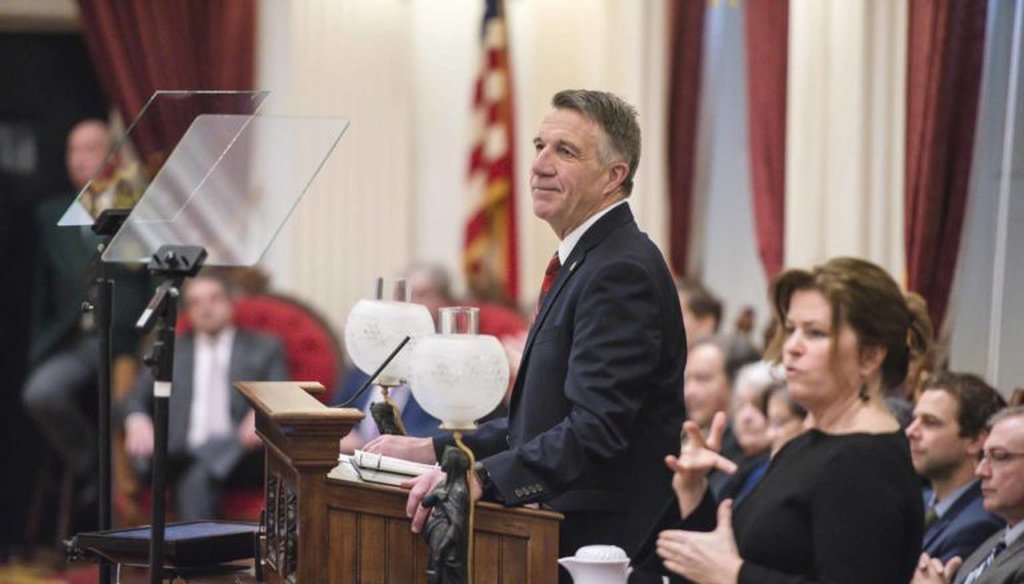

Our only agenda is to publish the truth so you can be an informed participant in democracy.
We need your help.


Gov. Phil Scott delivers his budget address to the Legislature in Montpelier on Jan. 24, 2019. Photo by Glenn Russell/VTDigger
- Vermont hopes to have it's signature health care reform effort, led by OneCare Vermont, fully rolled out by 2022.
- Gov. Phil Scott said paying providers through OneCare saved the state $7.7 million on Medicaid spending in 2018.
- The governor's left out context about total spending on OneCare that would have left his audience with a different impression.
Clarification: This article has been revised from its original posting, after Gov. Phil Scott’s office reached out with additional information clarifying his statement as focusing on the Medicaid patient pool. This made the statement more accurate — we changed the ruling from mostly false to half true — but Scott still left out important context about overall costs associated with the OneCare program.
Gov. Phil Scott trumpeted the successes of Vermont’s health care reform efforts in his budget address last month.
"There are compelling stories to be told, and accountable care is showing more potential than any other health care reform I can remember," he said of OneCare Vermont, the state’s accountable care organization.
"In 2018, the providers the state paid through the ACO reduced the amount of money spent on healthcare services by $7.7 million," Scott said.
That savings figure jumped out at us. Our research on OneCare has found mixed results — and
an open admission from health care officials that the program has not yet created the savings they hope to achieve. Did we miss something?
We asked Scott’s office for evidence and were referred to Ena Backus, director of health care reform for the state. She cited a Department of Vermont Health Access report on 2018 results for Medicaid patients.
The $7.7 million in savings came from a small portion of Vermont’s nearly 200,000 Medicaid patients. About 42,000 of those Vermonters participate in OneCare, said Alicia Cooper, director of payment reform for the department. An even smaller portion of those patients see doctors who are paid a set fee each month, rather than payments for each procedure.
And it’s that subset of patients — those participating in OneCare whose doctors are paid a monthly fee — who cost the state $7.7 million less to care for than was originally expected, according to Backus.
"That point that was made [by Scott] demonstrates that there was a change in provider behavior that we can measure," Backus said.
Ethan Latour, a spokesperson for Scott, further clarified this point in an email to VTDigger. "Those words, STATE and THROUGH THE ACO, explicitly describe the population," he wrote.
The problem? Scott referred in his speech to the "amount of money spent on health care services."
First off, his statement implies that there were savings in the entire health care system — not just a small piece of it. Secondly, the $7.7 million wasn't returned to taxpayers. Under the new model, OneCare Vermont and hospitals keep the savings, as a reward for keeping patients healthy.
OneCare actually spent more money than expected — about $1.5 million — on all medical care for state Medicaid patients in 2018, if you factor in the doctors who charged traditional fee per procedure rates.
Scott also didn’t mention that Vermont taxpayers paid OneCare $11.7 million for administrative costs that year.
OneCare collects money from Medicaid, Medicare and commercial insurance and then distributes it as a flat monthly payment for patient care. The administrative costs and incentives paid by the state cannot be entirely divorced from savings created by the program.
In addition, the governor cited savings in the Medicaid program but across the OneCare there were no net decreases in spending after administrative costs and incentives for providers.
Scott’s assessment led him to urge the Legislature to grant OneCare $5.7 million in additional Medicaid monies during the state budget adjustment process -- on the condition the accountable care organization applies for nonprofit status or meets equivalent transparency standards.
The real problem, Scott said, is OneCare’s ineffective public relations effort. In his budget speech, the governor invoked the state’s head regulator, Green Mountain Care Board chair Kevin Mullin, who in November urged the organization to tell a better story.
"I understand the ACO hasn’t done a great job explaining how they’re improving people’s health and reducing costs," Scott said. "But there are compelling stories to be told."
Cooper, from the Department of Vermont Health Access, said Scott’s $7.7 million assertion may be one of those stories. "At Medicaid, we‘re encouraged by these early results," she said. "That’s enough to warrant continued testing of the model."
Scott said, "in 2018, the providers the state paid through the ACO reduced the amount of money spent on healthcare services by $7.7 million."
That statement is partially accurate, but it does not account for the administrative costs or financial incentives paid by the state.
Politifact’s guidance describes "half true" as: "The statement is partially accurate but leaves out important details or takes things out of context."
Scott’s claim ignores important facts about the cost of OneCare that would lead his audience to draw a different conclusion about the program's financial performance — even for the specific patient population that he references in his statement.
We rate this claim half true.
Interview with Ena Backus, director of Health Care Reform, Agency of Human Services. 24 Jan. 2020.
Interview with Alicia Cooper, health care project director- payment reform, Department of Vermont Health Access. 24 Jan. 2020
Email from Ethan Latour, Office of the Governor. Feb 3, 2020.
Vermont Medicaid Next Generation Pilot Program 2018 Performance. Department of Vermont Health Access. 20 Sept. 2019.
In a world of wild talk and fake news, help us stand up for the facts.
